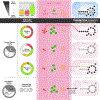The Molecular Link from Diet to Cancer Cell Metabolism
- PMID: 32504556
- PMCID: PMC7305994
- DOI: 10.1016/j.molcel.2020.05.018
The Molecular Link from Diet to Cancer Cell Metabolism
Erratum in
-
The Molecular Link from Diet to Cancer Cell Metabolism.Mol Cell. 2020 Nov 5;80(3):554. doi: 10.1016/j.molcel.2020.10.006. Mol Cell. 2020. PMID: 33157016 Free PMC article. No abstract available.
Abstract
Malignant cells remodel their metabolism to meet the demands of uncontrolled cell proliferation. These demands lead to differential requirements in energy, biosynthetic precursors, and signaling intermediates. Both genetic programs arising from oncogenic events and transcriptional programs and epigenomic events are important in providing the necessary metabolic network activity. Accumulating evidence has established that environmental factors play a major role in shaping cancer cell metabolism. For metabolism, diet and nutrition are the major environmental aspects and have emerged as key components in determining cancer cell metabolism. In this review, we discuss these emerging concepts in cancer metabolism and how diet and nutrition influence cancer cell metabolism.
Copyright © 2020 Elsevier Inc. All rights reserved.
Conflict of interest statement
Declaration of Interests J.W.L. advises Nanocare Technologies, Raphael Pharmaceuticals, and Restoration Foodworks.
Figures


References
-
- Bi J, Chowdhry S, Wu S, Zhang W, Masui K, and Mischel PS (2020). Altered cellular metabolism in gliomas — an emerging landscape of actionable co-dependency targets. Nat Rev Cancer 20, 57–70. - PubMed
Publication types
MeSH terms
Grants and funding
LinkOut - more resources
Full Text Sources
Medical

